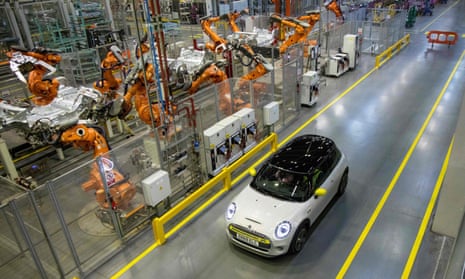Re << Britain to ramp up microchip production over fears China are poised to invade Taiwan (msn.com) >>
into what manufactured items would the UK put the microchips into?
and, without Team China nuclear reactors and solar gear, and 5G-enabled factories, why bother?
Suspicion, 'they' are winging it, today microchips and tomorrow, scones. They got it backward, should instead start small, with scones, before scones bolt the barn :0)))))))
okay okay, I doubt very much UK imports scones ... just saying
I love British comedy shows, they are truly outstanding, a world treasure.

starting restoring / friend-shoring / on-shoring basics would be another way to go oec.world :0))))) just joshing


The photograph below shows Team China-owned Kuka robots making German Minis in UK, much sold in China, and so, logically, 'they' just cut out the middle person and moving the plant
She said that when electric Minis were to be built again in Britain, it would be on an assembly-line platform developed by Great Wall, and that the existing Cowley lines would be stripped out as part of a major factory overhaul.
“Oxford is not geared up for electric vehicles,” she said. “It will need renovation and investment.” Asked when electric Minis will return to Oxford, she said: “There is no date.”
theguardian.com
BMW to axe UK production of electric Mini and relocate to China
Sophie Zeldin-O'Neill

A Mini electric car is pictured on the production line during its unveiling at the BMW group plant in Cowley. Photograph: Tolga Akmen/AFP/Getty Images
BMW is to axe all UK production of the award-winning electric Mini and relocate it to China, dealing a major blow to hopes that Britain could be a global hub for zero-emission vehicle manufacture.
BMW makes 40,000 electric Minis per year at its Cowley factory on the outskirts of Oxford.
In an article published by the Times on Saturday, it was confirmed that BMW Oxford’s production of electric vehicles will end next year as part of plans to reshape the carmaker’s lineup from 2024.
The move is a further blow to the UK’s ambition to become a leader in global electric car manufacturing, following Honda’s decision to quit Britain in 2016.
BMW’s joint venture with Great Wall Motor means their hatchback and small SUV models will now be made in east China, as will the next generation zero-emission Mini Aceman.
A new, electric version of the largest Mini model, the Countryman, will, BMW has confirmed, be manufactured at its plant in Leipzig.
The announcement follows confirmation by Mini boss, Stefanie Wurst, last week that a convertible model will join the all-new Mini Cooper range – due to launch in 2024 – and that it will be “coming home” in 2025 with production in the UK at the Mini Oxford factory.
Petrol Mini Coopers will be built in Oxford, in three-door, five-door and convertible forms, for export to markets such as the US, Japan and the Middle East, with BMW confirming that it will not halt production of Minis with internal combustion engines until 2030.
BMW’s decision comes after reports that Britain’s only planned large-scale battery factory, being built by Britishvolt in the north-east of England, will go bust if it does not receive a £200m rescue package.
Only a year ago, Boris Johnson, then prime minister, promised at the Cop26 climate summit in Glasgow, to fund a “£1bn electric car revolution” in the UK “creating hundreds of thousands of jobs”. His predecessor, Theresa May, intended that Britain would become “a world leader” in electric vehicle manufacturing and made it one of the “pillars” of her short-lived industrial strategy.
Kwasi Kwarteng, who was sacked as chancellor on Friday and replaced by Jeremy Hunt, said last year when he was business secretary that the electrified automotive industry would be “front and centre of Britain building back better”.
Those commitments — and the seven-year model cycles typically employed by automotive companies — indicate that the Oxford plant will not assemble any new electric vehicles until the next decade.
The historic Cowley factory has been the subject of speculation that BMW wants to sell the plant to Great Wall, which has made no secret that its big sales push into the European electric market will eventually lead it to seek its own production facilities in Europe.
Wurst denied that, stating: “Oxford will always be the home of Mini.” She said the decision to halt the electric Mini assembly in the UK was not linked to post-Brexit supply constraints and cross-border friction with the EU, or the lack of a nearby gigafactory, but because the Cowley plant was running inefficiently by having to produce electric and petrol cars on the same line.
Archie Bland and Nimo Omer take you through the top stories and what they mean, free every weekday morning
She said that when electric Minis were to be built again in Britain, it would be on an assembly-line platform developed by Great Wall, and that the existing Cowley lines would be stripped out as part of a major factory overhaul.
“Oxford is not geared up for electric vehicles,” she said. “It will need renovation and investment.” Asked when electric Minis will return to Oxford, she said: “There is no date.”
Asked whether Oxford could at some point in the future build both Minis and Great Wall brands such as Ora and Wey, she replied: “Maybe.”
A spokesman for Great Wall confirmed that the possibility of producing its own vehicles at Cowley had been the subject of “internal discussion”.
Wurst also dismissed suggestions that British consumers may balk at buying a Mini made in China, saying she could “see no reason”, as UK motorists are already buying some BMW models made in China.
A spokesperson for BMW said: “Oxford plays an important role in the BMW Group’s production strategy, with its high degree of flexibility, competitiveness and expertise and will remain at the heart of Mini production.” |




